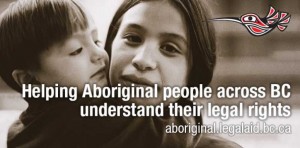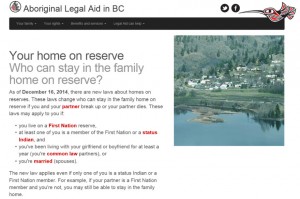Benefits and Services: Social Assistance on Reserve
 Food, shelter and clothing: these are the basic necessities that directly impact our quality of life. Meeting basic needs can be a challenge on reservations. If you live on reserve and are struggling to pay for food, shelter and clothing you can apply for social assistance.
Food, shelter and clothing: these are the basic necessities that directly impact our quality of life. Meeting basic needs can be a challenge on reservations. If you live on reserve and are struggling to pay for food, shelter and clothing you can apply for social assistance.
The LSS Aboriginal Legal Aid BC website has information to help get you started with an application. Below are highlights from the website; visit the site for more detail:
Who can get social assistance
You must be:
- an adult (19 or over)
- live on reserve in BC; and
- one of the following:
- a Canadian citizen
- a permanent resident
- a Convention refugee, or
- a sponsored immigrant whose sponsor can’t or won’t provide support. (Aboriginal Affairs and Northern Development Canada will decide whether this is the case.)
What is social assistance?
Social assistance is money and other benefits for people who:
- live on reserve
- don’t have enough money to meet their needs
- have no other reasonable way of getting money
In addition to regular benefits, social assistance benefits can include additional benefits for: people with certain types of physical or mental disabilities, people with medical conditions and people who face undue hardship issues like hunger and eviction. Some of these additional benefits are short-term and time-limited.
Where and how to apply for social assistance benefits
You can apply for social assistance with the band social development worker for the reserve you live on. You can reach them by calling the band office for your reserve.
For more information on the types of benefits, how to apply, and who can help, visit the LSS website here: Aboriginal Legal Aid in BC


